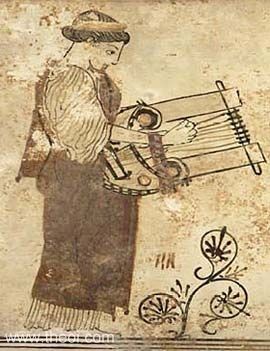'From the Heliconian Muses let us begin to sing'
The muse of epic poetry

Some of my students find it outrageous that I would ask them to actually walk into a library and find print sources for their research. They believe that they can find everything they need to know online — and in some cases they might be correct. At eHow.com, you can learn “How to Build a Concrete Storm Shelter”[1] or “How to Clean Your Coffee Maker With Vinegar.”[2] Using the information collated there, a friend of mine renovated an entire house to ready it for sale. But wait, there’s more: should you decide to write an epic poem, eHow breaks the process down into seven easy steps. Here are steps one through three:
1) Write a brief statement of the poem’s purpose before you begin recounting the story — say, to detail your dog Champ’s heroic crusade against backyard birds — followed by an invocation of the Muse.
2) Give a short, general outline of the action of the poem in the statement of the poem’s purpose.
3) Invoke the Muse next by first praising her, then by asking her to aid you in the writing of your poem. The Muse of epic poetry was Calliope, but you can also invoke Thalia (Muse of comedy) or Melpomene (Muse of tragedy).
(Read more: How to Write an Epic Poem | eHow.com http://www.ehow.com/how_3334_write-epic-poem.html#ixzz1WenURO6E)
Praise and invoke:
CALLIOPE,
As ye may se,
Regent is she
Of poetes al,
Whiche gaue to me
The high degre
Laureat to be
Of fame royall ;
— John Skelton, “WHY were ye Calliope embrawdered with letters of golde?”[3]
“Calliope,” whose name comes from the Greek and means “having a beautiful voice,”[4] is sometimes pictured with a harp, and sometimes with tablet and stylus. According to The Theogony of Hesiod, of the nine Muses who dwell on Olympus, Calliope “is the chiefest of them all, for she attends on worshipful princes: whomsoever of heaven-nourished princes the daughters of great Zeus honour, and behold him as they pour sweet dew upon his tongue, and from his lips flow gracious words.” So blessed, the singer becomes a servant of the Muses, “For it is through the Muses and far-shooting Apollo that there are singers and harpers upon the earth; but princes are of Zeus, and happy is he whom the Muses love: sweet flows speech from his mouth.” The singer “settles causes with true judgements” and “chants the glorious deeds of men of old and the blessed gods who inhabit Olympus.” Given this gift of singing “at once he forgets his heaviness and remembers not his sorrows at all.”[5]
While in the Classical tradition, the Muses serve as an intermediary between the supernatural and the singer/poet, in other traditions, such as that of the griots in West Africa, the poet possess supernatural powers him- or herself. In my series of commentaries, I will be exploring the manifestations of the epic in different cultural and historical contexts. And I wonder, poets out there, what epics do you consider to be part of your own lineage? I’ll be contacting some of you to ask.
[[1] http://www.ehow.com/how_2314200_build-concrete-storm-shelter.html
[2] http://www.ehow.com/how_2323550_clean-coffee-maker-vinegar.html
[3] From Marshe’s ed. of Skelton’s Workes (1568).
[4] “Calliope.” A Dictionary of Phrase and Fable. Edited by Elizabeth Knowles. Oxford University Press, 2006. Oxford Reference Online. Oxford University Press. University of Pennsylvania. 1 September 2011.
[5] The Theogony of Hesiod translated by Hugh G. Evelyn-White (1914).
Epic worlds